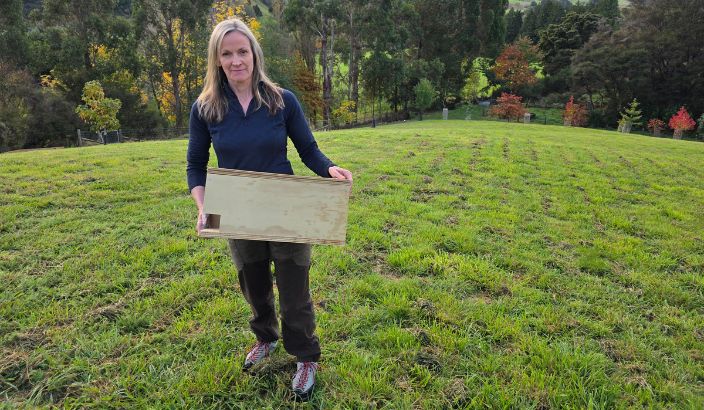Traps available for suburban sections


Rachel Simpson and two-year-old Ari are planning to make their Motueka Valley land a lot less hospitable to rats, stoats and hedgehogs with the delivery of their Motueka Catchment Collective-subsidised traps. Photo: Jacob Lucas.
Rachel Simpson is well aware that unwelcome rodents don’t stop at the fence line.
She and her husband and young son live on a three-hectare lifestyle property in Ngātīmoti, with a small wetland and views out to the Kahurangi National Park.
The abundant birdlife includes kereru, whio, tui, grey warbler, weka, long tailed cuckoo, bellbirds, brown creepers, fantails, and morepork, as well as visiting falcons, kaka and kea.
These are not the only creatures that come to call, however. The family installed game cameras to track the movement of wild deer, but what they mostly capture is rats and possums, running along gates and fences, while hedgehogs amble through the paddocks.
Rachel was determined to protect her corner of the world, and so the family jumped at the chance to order cheap predator jobs through the current Motueka Catchment Collective (MCC) initiative.
The project is being undertaken through Ministry for Primary Industries funding via the MCC, and is being coordinated by Fish and Game field officer Jacob Lucas.
“There’s already a lot of great work happening by individuals and trapping groups,” Jacob says, citing Friends of Flora and Farmers for Whio as two of the many organisations working hard to reduce predator numbers.
He hopes the current project helps to “join the dots” between these groups.
“We want people to play their part and do some backyard trapping, whether they’re on a postage size backyard section, or a farm,” he explains.
The rat tunnel/ trap, which operates like a giant enclosed mouse trap, are being sold for $15 each, rather than the usual $40. Jacob reckons that these are the best bet for urban backyards.
The larger DOC200 traps, good for larger properties, will also take care of stoats and hedgehogs, and cost $50 each – again, less than half price.
The group is also offering Trapinator possum traps for a discounted $20.
About 50 people have already jumped onboard, but Jacob reckons there is capacity for plenty more.
The MCC volunteers are grateful to the Nelson Trout Fishing Club, whose “focus fishery” is the Motueka River, says Jacob. Because of this connection, the fishing club has offered to help make the traps, which will keep costs down and offer even more bang for buck when it comes to funding.
The MCC team is also happy to help landowners with the set-up. Rachel says the MCC member who delivered her five assorted traps was really helpful, giving advice about the best locations to set them up around her property.
“We think it’s a really special spot and we’re hoping to improve and protect it as much as possible,” she says of her family’s own piece of paradise.
“We really hope our local community, both rural and urban, can become a part of the MCC trap community and help the Predator Free NZ goals. The whole Motueka River Catchment will thrive as a result.”
The term catchment, or whaitua, describes an area of land where rain flows into a common body of water – in this case, the Motueka River.
This catchment area is 2200m2 and extends almost to St Arnaud to the south, the Richmond Ranges to the east, Arthur Range/ Wharepapa to the west, and includes the southern face of the Tākaka Hill, Brooklyn and the Riwaka and Motueka townships. It is home to about 20,000 people, and is culturally, economically and ecologically significant.
The subsidised trap initiative closes on Friday, 16 May, with a limit of five traps per property. Allow about a month for delivery. To order, visit www.surveymonkey.com/r/G69JFGC or email [email protected].
